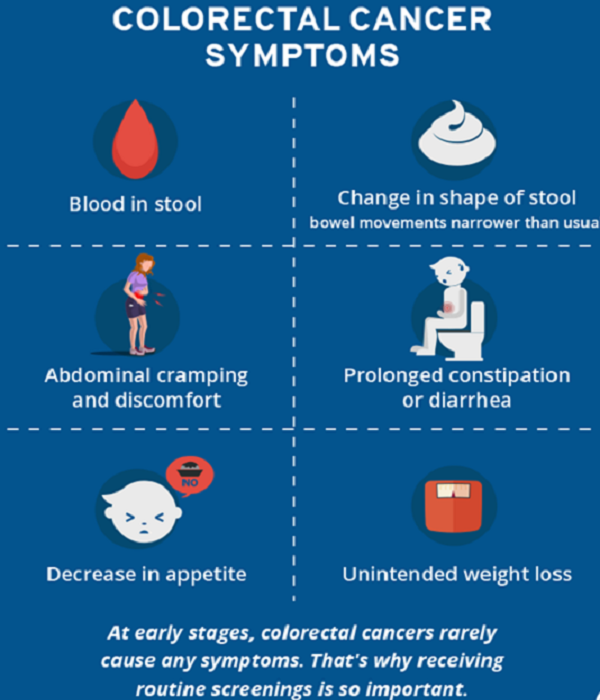"There’s data that colorectal cancer rates are rising in young people, and these symptoms are concerning to me. Should I get a colonoscopy?’” Expert suggests. Colonoscopies are used to search for polyps or other masses that can become cancerous.
The top five most frequent cancers in Viet Nam in males and females are cancers of the liver (17.6 % of new cases), lung (17.5 % of new cases), stomach (11.4% of new cases), breast (8.9% of new cases) and colorectum (7 % of all new cases).
“It’s extremely rare for an incidence of a disease to increase this much,” says Assoc.Prof.Dr.Nguyen Tan Cuong, Head of General Surgery Dept. at City International Hospital. A 2019 study further confirms that the incidence of colorectal cancer is getting more prevalent: The number of people diagnosed with colon cancer under the age of 50 has risen from 10% in 2004 to 12.2% in 2015. According to the research, which was published in the American Cancer Society journal Cancer, when younger patients are diagnosed, the disease is more likely to have advanced to stages three or four.
Researchers aren't yet sure what's behind the rise, but they have some theories. For one, the same lifestyle factors contributing to the growing obesity epidemic are also associated with colorectal cancer. “It’s likely that some of the behaviors that contribute to obesity, like a sedentary lifestyle and poor diet, like high consumption of red and processed meat, and a low consumption of milk products, lead to [colorectal cancer]," on the 2017 study. Some researchers are also exploring the connection between gut microbiome changes and cancer, but have yet to determine any direct link, says Assoc.Prof.Dr.Nguyen Tan Cuong.
Based in part on these study findings, the screening age for colorectal cancer was lowered to 45 for people with average risk (meaning they have no family history of the disease). Other groups continue to advise starting colonoscopies at age 50. Meanwhile, it's smart to keep an eye out for colorectal cancer symptoms. Many of the signs of colorectal cancer are easy to ignore or shrug off as something minor—and young people are especially prone to dismissing them, says Assoc.Prof.Dr.Nguyen Tan Cuong. “They think it’s not a big deal and they’re too busy working and living their lives, and they’re more likely to be diagnosed at a later stage.”
Here are the colorectal cancer symptoms Assoc.Prof.Dr.Nguyen Tan Cuong says you shouldn't ignore:
-
Blood in the stool (which can be bright red or dark)
-
Bleeding from the rectum
-
Abdominal cramping (that can’t be explained by a bug or something you ate)
-
A change in your bowel movements—whether that’s in timing, frequency, shape of stool, or amount of stool
-
Persistent constipation or diarrhea
-
Unexplained weight loss
If you experience any of these symptoms of colon cancer for more than a week, it’s time to talk to a doctor. Do your homework before your appointment and find out if you have a family history of colorectal cancer—if you do, it may prompt your doc to screen you, says Assoc.Prof.Dr.Nguyen Tan Cuong.
Assoc.Prof.Dr.Nguyen Tan Cuong warns, however, that if you feel brushed off by your MD, you may need to push for further screening. “Most young people will just have some blood in their stool, and it will be diagnosed as hemorrhoids, which is the most likely thing,” she says. “But we need to raise awareness among physicians that these symptoms need to be followed up.”
Assoc.Prof.Dr.Nguyen Tan Cuong agrees. “Say, ‘There’s data that colorectal cancer rates are rising in young people, and these symptoms are concerning to me. Should I get a colonoscopy?’” he suggests. Colonoscopies are used to search for polyps or other masses that can become cancerous.
You can lower your risk of colorectal cancer by eating a healthy diet with lots of fruits, vegetables, and fiber, and cutting down on red and processed meats. Milk has also been shown to help lower risk, says Assoc.Prof.Dr.Nguyen Tan Cuong. Exercise and maintaining a healthy weight will also help protect you from rectal and colon cancer.
“Know your body and know the colorectal cancer symptoms, and live a healthy and active lifestyle,” says Assoc.Prof.Dr.Nguyen Tan Cuong. “Those are the things we can do right now to help avert risk.”

For appointment or more information about the services provided by General Surgery Department, please contact:
- Nurse Station: (8428) 6280 3333, ext. 8247 or 8246
- Patient service: (8428) 6280 3333, ext. 8242
- Operator: (8428) 6280 3333, ext. 0
- Address: No. 3, 17A Street, Binh Tri Dong B Ward, Binh Tan Dist. (Next to AEON Mall Binh Tan). Ho Chi Minh City.
- Website: https://cih.com.vn/en/
- Email: This email address is being protected from spambots. You need JavaScript enabled to view it.










